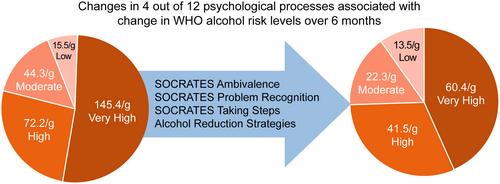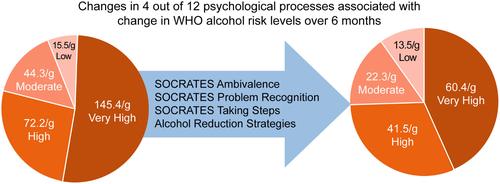There is a lack of randomized controlled trials of behavioral interventions and process-level research related to alcohol reduction among patients with chronic liver disease (e.g., hepatitis C viral (HCV) infection). We conducted a process-level, secondary analysis of the Hepatitis C-Alcohol Reduction Treatment (HepART) trial to investigate the association between change in psychological processes posited by the Integrated Behavioral Model (IBM) and change in World Health Organization (WHO) drinking risk levels.
Patients with HCV who consume alcohol were recruited from hepatology clinics and received provider-delivered SBIRT (Screening, Brief Intervention, Referral to Treatment) or SBIRT+ 6 months of co-located alcohol counseling. Treatment arms were combined for this analysis because no between-group differences were found. At baseline and 6 months, the timeline followback method was used to determine alcohol risk levels according to the 2000 WHO risk categories (based on average grams of alcohol per day). Changes in alcohol consumption and WHO risk levels were quantified and regressed on change in individual psychological processes (e.g., readiness, self-efficacy, motives, attitudes, and strategies) from baseline to 6 months.
At the baseline assessment, 162 participants were classified as abstinent (5%), low (47%), moderate (16%), high (19%), or very high (13%) WHO risk levels. At 6 months, 38% remained at the same risk level and 48% decreased by at least one level. In univariate analyses, changes in 7 of 12 psychological processes were associated with change in risk levels. Adjusted multivariate analyses demonstrated that change in four processes were significantly associated with change in risk levels, including SOCRATES Taking Steps, Ambivalence, and Recognition scores and alcohol reduction strategies.
These findings demonstrate significant reductions in quantitative indices of alcohol consumption following opportunistic alcohol interventions in patients with HCV. However, results provided mixed support for associations between change in IBM psychological processes and alcohol consumption.



